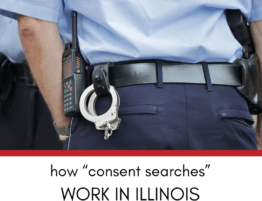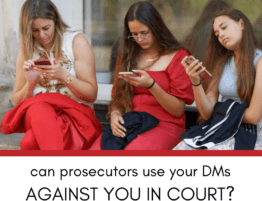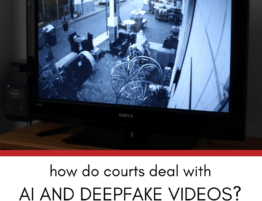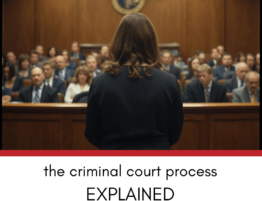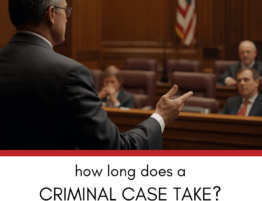
Understanding what can be used as evidence in court is crucial when facing legal proceedings. Knowing the different types of evidence and how they can impact your case helps you prepare and defend yourself effectively.
What Can Be Used as Evidence in Court?
When it comes to court proceedings, various forms of evidence can be presented to support or refute the claims made by each party. This guide explains the following:
- Physical evidence
- Digital evidence: social media and text messages
- Witness testimony
- Documentary evidence
- Expert testimony
- Frequently asked questions
Here’s a closer look at each.
Physical Evidence
Physical evidence includes any tangible items that can be presented in court to prove or disprove a fact related to the case. This type of evidence can include:
- Weapons: Guns, knives, or any object used to commit a crime.
- Clothing: Items worn by the victim or suspect that may have forensic value.
- Fingerprints: Collected from crime scenes to identify suspects.
- DNA Evidence: Biological samples like blood, hair, or saliva used to link a suspect to a crime.
- Drugs and Paraphernalia: Substances and related items seized in drug-related cases.
Physical evidence is often considered highly reliable because it can directly link a suspect to a crime scene or victim.
Related: Information for defendants in Chicago
Digital Evidence: Social Media and Text Messages
In today’s digital age, social media and text messages are increasingly used as evidence in court. Digital evidence can include:
- Social Media Posts: Public and private posts, comments, photos, and videos from platforms like Facebook, Twitter, and Instagram can be used to establish timelines, motives, or alibis.
- Text Messages: Messages exchanged between parties can provide insights into intent, planning, and communication related to a crime. They can also corroborate or contradict testimonies.
- Emails: Electronic mail can serve as evidence of communication, agreements, or threats.
- GPS Data: Location data from devices can place individuals at specific locations at certain times.
Digital evidence must be authenticated, meaning its origin and integrity need to be verified before it can be admitted in court.
Witness Testimony
Witness testimony is a critical form of evidence in many cases. It involves individuals providing firsthand accounts of events they observed. Witnesses can include:
- Eyewitnesses: People who directly saw the crime or significant events.
- Character Witnesses: Individuals who can speak to the character and behavior of the defendant or victim.
- Expert Witnesses: Professionals with specialized knowledge relevant to the case who can provide opinions and analyses.
Witness testimony is valuable for providing context, verifying facts, and offering perspectives that physical evidence alone cannot.
Related: A jury’s role in criminal trials in Illinois
Documentary Evidence
Documentary evidence consists of any documents that can be used to support or refute claims in a case. This type of evidence can include:
- Contracts and Agreements: Documents outlining the terms and conditions agreed upon by parties.
- Financial Records: Bank statements, invoices, receipts, and ledgers that can establish financial transactions or discrepancies.
- Official Records: Birth certificates, marriage licenses, police reports, and other government-issued documents.
Documentary evidence is essential for establishing facts, proving transactions, and validating claims made by the parties involved.
Expert Testimony
Expert testimony involves specialists providing insights based on their expertise. Experts can analyze evidence, offer professional opinions, and help the court understand complex issues. Types of expert witnesses include:
- Forensic Scientists: Experts in analyzing physical evidence like DNA, fingerprints, and blood spatter.
- Medical Professionals: Doctors who can testify about injuries, causes of death, or mental health conditions.
- Financial Experts: Accountants or economists who can analyze financial data and provide insights into financial crimes or disputes.
Expert testimony can be critical in cases where specialized knowledge is necessary to interpret the evidence and reach a conclusion.
FAQ About Evidence in Court
Check out these commonly asked questions about what can be used as evidence in court. If you don’t see your question here, please call our office and we’ll find you the answers you need.
How Is Evidence Admitted in Court?
Evidence is admitted in court through a process called authentication. This involves verifying the evidence’s origin and integrity to ensure it is reliable. The judge will decide whether the evidence is admissible based on its relevance, authenticity, and adherence to legal standards.
Can Illegally Obtained Evidence Be Used in Court?
Generally, evidence obtained illegally, such as through unlawful searches or without proper warrants, cannot be used in court. This is known as the exclusionary rule, which protects your rights under the Fourth Amendment.
How Can Social Media Posts Be Used as Evidence?
Social media posts can be used to establish timelines, motives, and alibis. They can also corroborate or contradict other evidence and testimonies. However, the authenticity and relevance of social media evidence must be verified before it is admitted in court.
What Should I Do if I Believe Evidence Against Me Is False?
If you believe the evidence against you is false or misleading, inform your lawyer immediately. Your lawyer can investigate the evidence, challenge its authenticity, and present counter-evidence to refute the false claims.
Related: What should you tell your lawyer if you’re accused of sexual assault?
Can Expert Witnesses Be Cross-Examined?
Yes, expert witnesses can be cross-examined by the opposing party. This allows both sides to challenge the expert’s credibility, methodology, and conclusions, ensuring a fair evaluation of the expert testimony.
Do You Need to Talk to an Attorney?
If you’ve been accused of a crime, we may be able to help you – and don’t worry: It’s completely confidential. Call us at 847-920-4540 or fill out the form below to schedule your free, private consultation with an experienced and skilled Chicago criminal defense attorney now.
Contact Us
"*" indicates required fields


